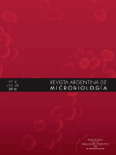
REVISTA ARGENTINA DE MICROBIOLOGIA
Scope & Guideline
Pioneering accessible research in the heart of microbiology.
Introduction
Aims and Scopes
- Microbial Pathogenesis and Infectious Diseases:
The journal frequently publishes research on the mechanisms of pathogenesis, the epidemiology of infectious diseases, and the impact of microbial infections on human and animal health. - Microbial Diversity and Ecology:
Studies focusing on the diversity of microbial populations in various environments, including clinical, agricultural, and natural ecosystems, are a core area of interest. - Biotechnology and Applied Microbiology:
Research on the application of microorganisms in biotechnology, such as biocontrol agents, probiotics, and bio-remediation, reflects the journal's commitment to practical applications of microbiology. - Antimicrobial Resistance:
The journal addresses the growing concern of antimicrobial resistance, emphasizing studies that explore resistance mechanisms, epidemiology, and implications for public health. - Food Microbiology and Safety:
Research related to foodborne pathogens, spoilage organisms, and the microbiological quality of food products is an important focus, contributing to food safety and public health. - Environmental Microbiology:
The journal includes studies on microbial interactions in environmental contexts, including soil microbiology, water quality, and the role of microbes in nutrient cycling.
Trending and Emerging
- Probiotics and Gut Microbiota:
An increasing number of studies are focusing on probiotics, prebiotics, and their effects on gut health, reflecting growing interest in the microbiome and its implications for health and disease. - Molecular and Genomic Approaches:
Research employing molecular techniques, including genomic characterization of pathogens and metagenomic analyses, is on the rise, highlighting the importance of advanced methodologies in understanding microbial communities. - Antimicrobial Stewardship and Resistance Mechanisms:
There is a growing emphasis on studies that explore the mechanisms of antimicrobial resistance and the development of strategies for antimicrobial stewardship, indicating a strong public health focus. - Emerging Infectious Diseases:
Research addressing novel pathogens, including zoonotic diseases and viral infections, has gained prominence, particularly in the context of global health threats like COVID-19. - Environmental Microbiology and Climate Change:
Emerging themes include the study of microbial responses to environmental changes and their roles in biogeochemical cycles, reflecting a growing awareness of the impact of climate change on microbial ecosystems.
Declining or Waning
- Traditional Mycology Studies:
While mycology remains a key area, traditional studies focusing solely on fungal taxonomy without a clear application or ecological context have diminished, as research increasingly seeks to integrate ecological and applied perspectives. - Epidemiological Studies of Non-Communicable Diseases:
Research linking microbial factors to non-communicable diseases has become less frequent, possibly due to a shift towards understanding infectious diseases and their implications for public health. - Basic Microbial Physiology:
The focus on fundamental studies of microbial physiology without direct applications or connections to health or environmental issues has waned, as applied research gains more traction. - Veterinary Microbiology:
While still relevant, the volume of research specifically addressing veterinary microbiology has decreased, possibly due to a broader focus on human health and zoonotic diseases.
Similar Journals
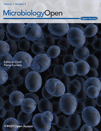
MicrobiologyOpen
Empowering discovery and collaboration in microbiology.MicrobiologyOpen is a prestigious, open access journal published by WILEY, dedicated to advancing the field of microbiology. Since its inception in 2012, this journal has firmly established itself as a significant platform for researchers, professionals, and students alike, facilitating the dissemination of high-quality research findings across a wide range of microbiological disciplines. With an impressive impact factor and a ranking in the 76th percentile of Scopus for immunology and microbiology, MicrobiologyOpen offers a robust forum for innovative studies, reviews, and compelling insights that push the boundaries of scientific understanding. The journal's commitment to open access ensures that groundbreaking research is freely available to the global community, fostering collaboration and knowledge-sharing. As it continues to evolve until 2024, MicrobiologyOpen remains pivotal for anyone looking to stay at the forefront of microbiological research.
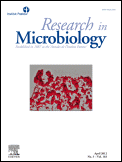
RESEARCH IN MICROBIOLOGY
Exploring the intricate world of microbes and their impact.Research in Microbiology, published by Elsevier, is a prominent academic journal devoted to advancing the field of microbiology, encompassing a diverse array of topics including immunology, molecular biology, and biochemistry. Established in 1987, the journal has expanded its focus over the years, with a commendable impact factor reflecting its relevance and influence in the scientific community. Although it does not currently offer open access options, Research in Microbiology remains a crucial resource for researchers and professionals seeking to stay abreast of the latest findings and methodologies. The journal holds a respectable Q2 ranking in Medicine (miscellaneous) and a Q3 ranking in both Microbiology and Molecular Biology for 2023, highlighting its position within the scholarly landscape. With its base in France and accessible to a global audience, Research in Microbiology continues to foster scholarly exchange, making it an essential platform for the dissemination of impactful microbiological research.

ARCHIVES OF MICROBIOLOGY
Bridging Disciplines, Inspiring DiscoveriesThe Archives of Microbiology, published by Springer, is a reputable journal in the field of microbiology, serving as a vital platform for the dissemination of groundbreaking research and critical reviews since its inception in 1974. With an ISSN of 0302-8933 and an E-ISSN of 1432-072X, this journal operates out of Germany and maintains a global reach, promoting high-quality scholarship across multiple disciplines, including biochemistry, genetics, and molecular biology, as evidenced by its Q2 ranking in Medicine (miscellaneous) and consistent Q3 placements in other categories in 2023. Although the journal does not offer open access options, its rigorous peer-review process ensures that published articles are of the highest standard, making it an essential resource for researchers, professionals, and students keen on advancing their understanding of microbial sciences. As the journal converges toward 2024, it remains committed to fostering innovative microbiological research and facilitating interdisciplinary dialogue within the scientific community.

INDIAN JOURNAL OF MICROBIOLOGY
Elevating Microbial Studies to New HeightsINDIAN JOURNAL OF MICROBIOLOGY, published by Springer, serves as a vital platform for the dissemination of cutting-edge research in the field of microbiology. With an ISSN of 0046-8991 and an E-ISSN of 0973-7715, this esteemed journal invites contributions that span various disciplines within microbiology, encompassing both fundamental studies and applied research that can impact health, environment, and industry. Recognized in the Q3 category in Microbiology for 2023, and ranking #80 out of 182 in Scopus’ Microbiology category, it reflects its commitment to quality and significance in the academic community. Authors and researchers benefit from the journal's comprehensive review process, which enhances the visibility and reach of their work. While no open access options are currently offered, the INDIAN JOURNAL OF MICROBIOLOGY remains a premier choice for those aiming to contribute to the ongoing dialogue in microbiological studies, ensuring that knowledge continues to evolve and thrive.
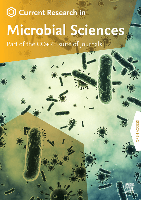
Current Research in Microbial Sciences
Championing the Latest Breakthroughs in MicrobiologyCurrent Research in Microbial Sciences is a distinguished peer-reviewed journal published by Elsevier, focusing on the dynamic and rapidly advancing fields of microbiology and infectious diseases. With an ISSN of 2666-5174, this journal has established itself as an essential resource for researchers, professionals, and students alike, offering the latest findings and insights from 2020 to 2024. The journal holds a significant position in the academic landscape, achieving a Q2 ranking across multiple categories, including Immunology and Microbiology, Infectious Diseases, and Medical Microbiology, demonstrating its impact in these critical areas of study. With impressive Scopus rankings—such as being placed in the 94th percentile for Immunology and Microbiology—current research is well-supported by a thriving scientific community. Although the journal is not open access, it serves as a vital platform for disseminating high-quality research and fostering collaboration within the microbial sciences. Engaging with this journal enables professionals and researchers to stay abreast of innovations and contribute to the collective body of knowledge that shapes our understanding of microbial interactions and infectious diseases.
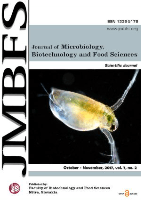
Journal of Microbiology Biotechnology and Food Sciences
Empowering scholars to tackle today's challenges in microbiology and food sciences.Journal of Microbiology Biotechnology and Food Sciences, published by SLOVAK UNIV AGRICULTURE NITRA, is a distinguished open-access journal dedicated to advancing scholarship in the interrelated fields of microbiology, biotechnology, and food sciences. With an ISSN of 1338-5178, this journal has been accessible to researchers worldwide since 2011, providing a platform for innovative studies that contribute to the understanding of microbial processes, biotechnological advancements, and food science applications. As reflected in its 2023 category quartiles, the journal holds notable positions in Biotechnology (Q3) and Food Science (Q3), and while it ranks in the lower quartiles for Microbiology (Q4) and Molecular Biology (Q4), it is committed to enhancing its impact within these domains. The journal encourages the submission of high-quality research articles, reviews, and short communications that address critical issues in these fields, making it an essential resource for academics, industry professionals, and students alike. Emphasizing both foundational research and practical applications, the Journal of Microbiology Biotechnology and Food Sciences stands as a vital contributor to the scientific discourse, fostering innovation and collaboration among researchers aiming to solve pressing challenges in food safety, biotechnology development, and microbial studies.
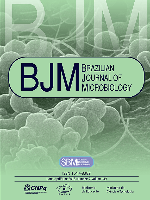
BRAZILIAN JOURNAL OF MICROBIOLOGY
Innovating Research in Microbiology and BeyondThe BRAZILIAN JOURNAL OF MICROBIOLOGY, published by SPRINGER, stands as a pivotal platform in the field of microbiology, offering an open access model since 2000. With the ISSN 1517-8382 and E-ISSN 1678-4405, this esteemed journal encourages the dissemination of groundbreaking research and innovative methodologies that contribute to the understanding of microbial life, its role in health and disease, and its environmental impact. Based in Switzerland and accessible globally, the journal’s categorization in the Q3 quartile for Microbiology reflects its commitment to quality and relevance in the scientific community. As of 2023, it ranks 121 out of 182 in the Scopus listings for Microbiology, further highlighting its growing influence in immunology and microbiological research. With converged years spanning from 1992 to 2024, the journal continues to support a diverse range of studies, making it an invaluable resource for researchers, professionals, and students alike.

JOURNAL OF MICROBIOLOGY AND BIOTECHNOLOGY
Pioneering Research in Microbial and Biotechnological SciencesJOURNAL OF MICROBIOLOGY AND BIOTECHNOLOGY, published by the Korean Society for Microbiology and Biotechnology, is a premier academic journal based in South Korea that has been at the forefront of advancing knowledge in the fields of microbiology, biotechnology, and their applied sciences since its inception in 1991. This journal holds a commendable Q2 quartile ranking in key categories, including Applied Microbiology and Biotechnology, showcasing its significant impact within the academic community. With an emphasis on high-quality, peer-reviewed research, the journal aims to disseminate innovative findings that foster deeper understanding and advancements in microbial and biotechnological sciences. Researchers, professionals, and students utilize this journal to stay informed about contemporary developments and to inspire future investigations. Although it is not an open-access journal, its content is accessible through various academic libraries and databases, providing a vital resource for those engaged in cutting-edge research.

International Journal of Microbiology
Innovating Solutions in Medical, Agricultural, and Environmental MicrobiologyWelcome to the International Journal of Microbiology, a premier platform dedicated to the dissemination of cutting-edge research in the field of microbiology. Published by HINDAWI LTD, this open-access journal has been making significant strides since its inception in 2009, ensuring that high-quality research is accessible to all. Situated in Egypt, the journal caters to an international audience, fostering collaboration across borders. With a commendable impact factor and recognized in the Q2 category for both general and medical microbiology, it ranks 48th out of 182 and 40th out of 140, respectively, according to Scopus statistics, placing it among the top-tier journals in its field. The International Journal of Microbiology publishes articles that explore various aspects of microbiology, from fundamental studies to applied research, thus contributing significantly to advancements in medical, agricultural, and environmental microbiology. This journal is an essential resource for researchers, professionals, and students eager to stay at the forefront of microbiological studies and their applications.

Microbiology Research
Fostering Collaboration in Microbial InnovationMicrobiology Research, published by MDPI, stands as a pivotal open-access journal in the field of microbiology, having established its presence since 2010. Based in Switzerland, this journal strives to provide a platform for innovative research and cutting-edge findings in various branches of microbiology, including medical microbiology and molecular biology. With an impact factor that reflects its dedication to scholarly excellence, Microbiology Research is classified in the Q3 category for both microbiology and medical microbiology, and Q4 for molecular biology as of 2023, indicating its growing importance and outreach within these domains. The journal aims to foster discussion and collaboration among researchers, professionals, and students by presenting articles that cover a wide array of topics and methodologies in microbiological research. Leveraging its open-access model, Microbiology Research ensures that high-quality research is accessible to a global audience, thus facilitating the advancement of knowledge and innovation in the microbial sciences.